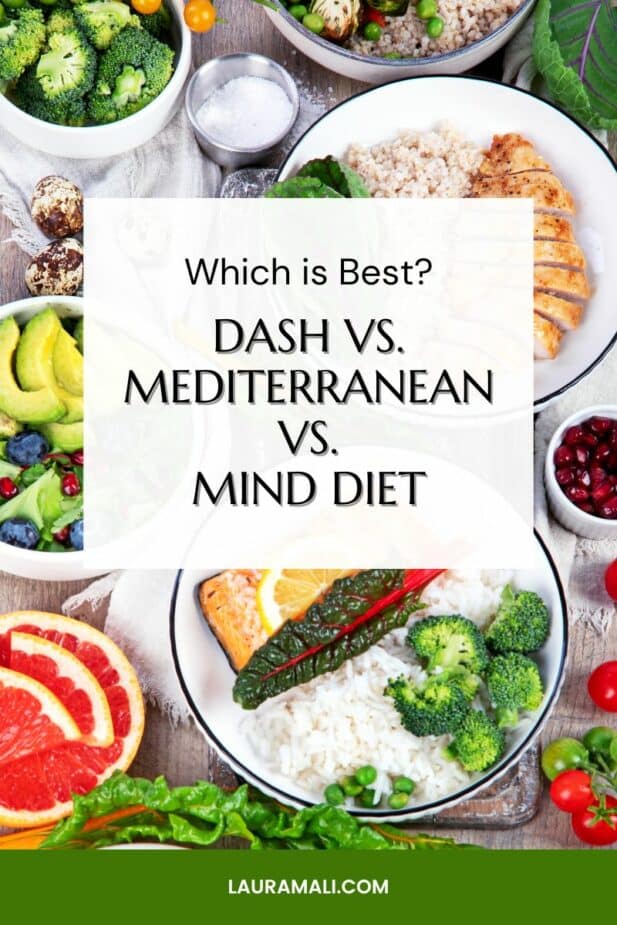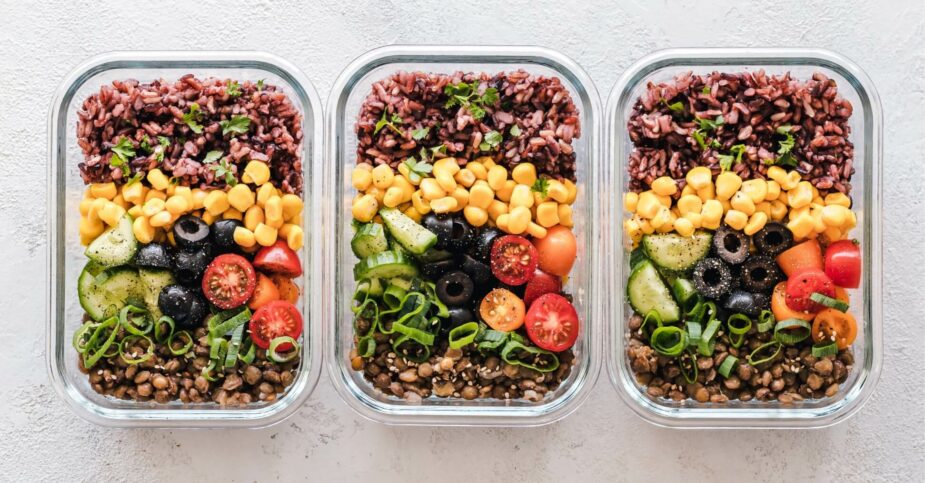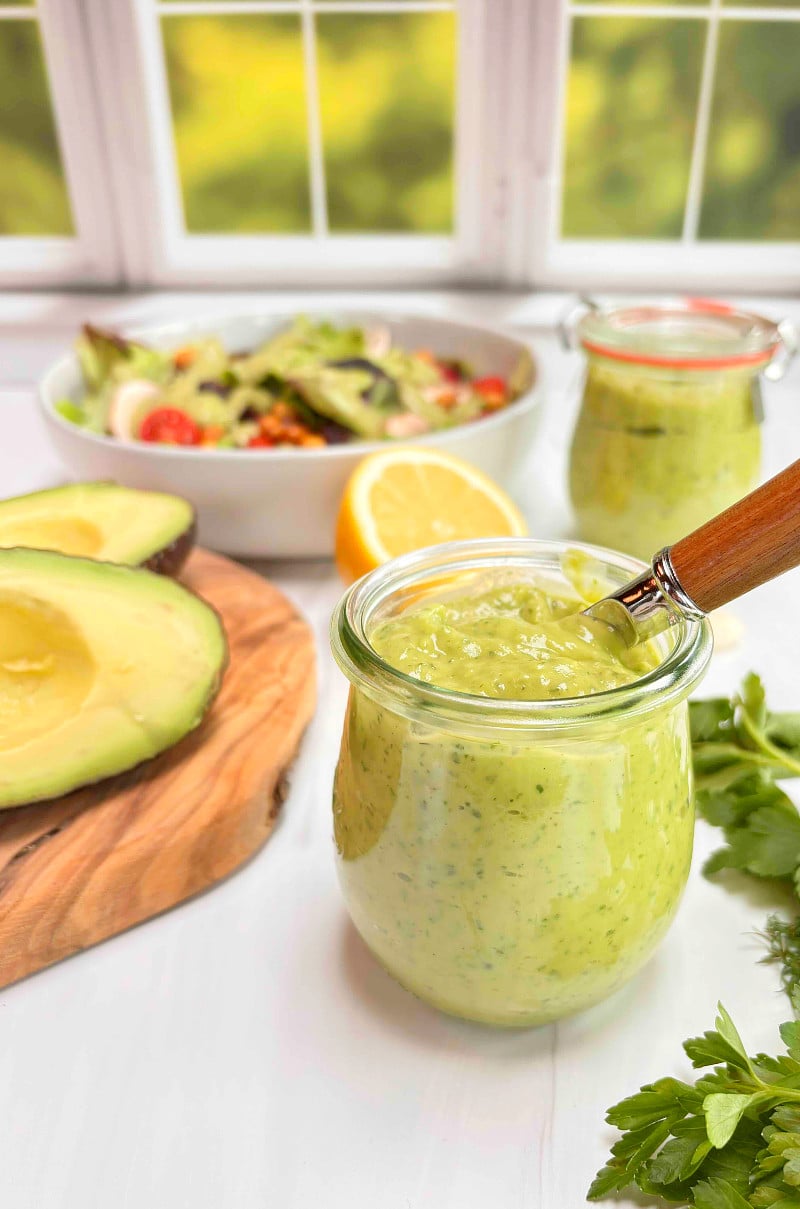ARTICLE SUMMARY
1. The DASH, Mediterranean, and MIND diets are routinely rated as some of the healthiest diets for overall health. While there may be some overlaps, they each have recommended foods and unique health benefits.
2. The DASH diet focuses on blood pressure management, the MIND diet supports brain health, and the Mediterranean diet focuses on improving overall health.
3. The DASH diet, Mediterranean diet, and MIND diet all encourage you to incorporate more nutrient-rich foods like fruits, vegetables, whole grains, and healthy fats into your daily eating plan while limiting added sugars, saturated fat, and fried foods for better overall health.
Discovering the right diet for your health goals can often feel like navigating a maze. Among the top contenders are the DASH Diet, the Mediterranean Diet, and a blend of the two, the MIND Diet. While you might be familiar with these dietary plans, understanding their differences and determining the best fit for you can be puzzling.
As a Registered Dietitian Nutritionist and the author of the cookbook, MIND Diet for Two, I often field questions about all of these diets. In this article, I’ll break down each diet, outline its core principles, recommended foods, and what to limit. We’ll weigh the pros and cons of each approach, and look at which may suit your situation the best.
Additionally, I’ll share practical tips for adopting these diets seamlessly into your lifestyle and highlight my go-to resources for further information and delicious recipes.
<<<This article includes Amazon affiliate links which means, if you click on a link and make a purchase I will earn a small commission. >>>
Table of Contents
What is the DASH Diet?
Dietary Approaches to Stop Hypertension (DASH) is an eating plan rich in colorful fruits and vegetables, low-fat dairy foods, poultry and fish, and nuts and seeds.
Research in the 1990s found that people with elevated blood pressure who followed an eating plan high in fruits, vegetables, and low-fat dairy products and low in saturated fat could reduce their blood pressure significantly.
What is also remarkable is that their blood pressure was lower after just 2 weeks of following the diet and remained lowered throughout the eight weeks they followed the diet.
Why is this research important? This study, and subsequent studies, shows that it is possible to lower blood pressure levels significantly by making changes to our diets that don’t focus just on reducing the amount of sodium we eat. There’s a lot more than the salt shaker that impacts your blood pressure!
Foods Encouraged on the DASH Diet
The DASH diet focuses on foods high in potassium, calcium, magnesium, and fiber and encourages minimizing your sodium intake. While not a strict diet, this eating plan does recommend getting specific servings of fruits, vegetables, whole grains, and dairy foods daily.
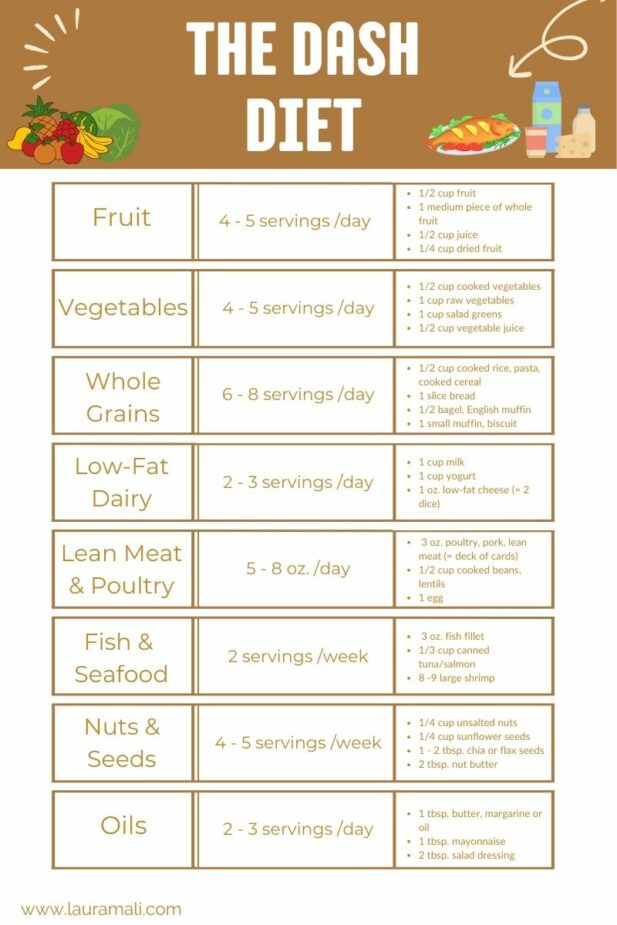
Foods to Avoid on the DASH Diet
While not overly restrictive, the DASH diet recommends limiting foods that are high in saturated fat, sugar, and sodium. Foods commonly recommended to avoid or limit are:
- Fried Foods: French fries, chips, and fried chicken
- Sweets: Sugary sodas, sweetened teas and coffee, and desserts
- High Sodium Foods: Salted chips, regular canned soups or packaged meals, deli meats, hot dogs, and jerky.
- High-Fat Foods: Sausage, bacon, fatty cuts of red meat, cream, butter, cheese, and ice cream.
Pros of Following the DASH Diet
There are many benefits you can get from following the DASH diet.
- Lowered Blood Pressure
- Weight Loss
- Lowered Risk of Stroke
- Reduced Cholesterol
- Improved Energy
- Better Sleep
- Reduced Constipation
Cons of Following the DASH Diet
There are very few cons to following the DASH diet, however, if you are lactose intolerant or have a milk allergy you should choose plant-based dairy alternatives. Similarly, if you have other food allergies to nuts or soy, you will need to choose alternatives.
Other issues could be the diet requires a little more planning and time in the kitchen, but with some planning that should be minimal.
Finding foods that fit this diet may be slightly more difficult when eating out than other diets, but with some practice and following a few tips (see below), you can certainly enjoy a nice restaurant meal!
Now, let’s take a look at another “top diet” which is routinely touted for its health benefits.
What is the Mediterranean Diet?
This diet is based on the eating patterns of people who live in countries surrounding the Mediterranean Sea, like Italy, Spain, Morocco, and Greece. It is rich in fruits and vegetables, whole grains, seafood, olive oil, and legumes. It includes a little red wine, (yay!) poultry, and a little red meat.
Researchers realized there might be something to how the people in Mediterranean countries ate and lived that contributed to their longevity.
A few years ago a paper came out about “The Blue Zones.” The Blue Zones are parts of the world that have a higher percentage of people who live to over 100 than other parts of the world. Two areas are in the Mediterranean; Sardinia, Italy, and Ikaria, Greece.
What do they have in common? There are seven key areas, but one main one is the types of foods they enjoy.
Compared to the average American diet, people in these countries ate more whole foods and less processed foods. They ate more greens, beans and legumes, fruits, and a variety of seafood.
And even though they used a fair amount of olive oil and cheese – which seems counterintuitive to the low-fat recommendations of the 80s and 90s – they still enjoyed a longer and more active life than Western cultures.
Research has shown that people who follow the Mediterranean diet have a giant leg up on health outcomes compared to those who follow an average American diet. Those following a traditional Mediterranean diet had lower rates of heart disease, diabetes, obesity, and dementia.
The Mediterranean diet is consistently ranked the best overall diet for health in US News and World Reports and the Annual Best Diets Report because it is an overall healthy meal plan. The research consistently shows those who follow it have lower rates of heart disease, diabetes, cancer, and other chronic diseases.
And as a registered dietitian, I always want to help empower my clients to find an eating plan that supports their long-term health and wellness and is sustainable.
Foods Encouraged on the Mediterranean Diet
The Mediterranean diet does focus on including more plant-based foods, while still incorporating animal-based items like seafood, poultry, eggs, low-fat dairy products, and a limited amount of lean meat. Below is a general guide for the types of foods and servings suggested per day. Keep in mind that this is just a guide to help you get started.
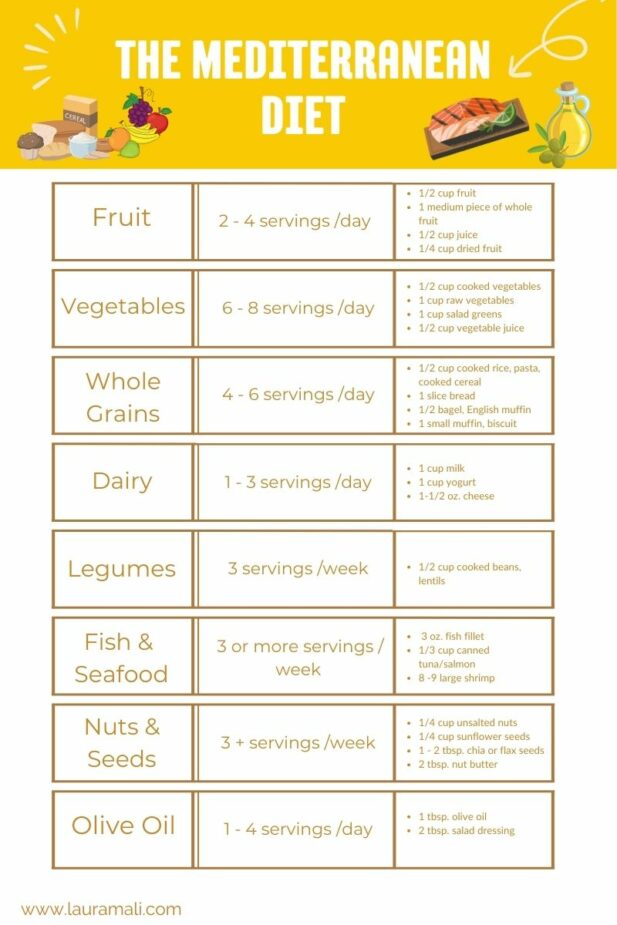
Foods to Avoid on the Mediterranean Diet
While most foods are allowed on the Mediterranean diet there are some that you are encouraged to limit. Those include:
- Red Meat (no more than 1 – 2 times a week)
- Sweets
- Fried Foods
Pros of Following the Mediterranean Diet
Like the DASH diet, there are many benefits you may experience from following a Mediterranean diet.
- Lowered Risk of Cardiovascular Disease
- Lowered Risk of Type 2 Diabetes
- Weight Loss
- Improved Energy Levels
- Lowered Risk of Dementia
- Improved GI Health
Cons of Following the Mediterranean Diet
There are very few cons to following the Mediterranean diet.
- Some people may find that it takes more time to prepare meals as fewer processed foods are used and more frequent trips may be needed to the store or farmer’s market. Because the diet includes more whole foods and fewer processed items, there is also a concern that it may be more expensive to follow.
- For some people of other cultures, the diet may include unfamiliar foods, while foods they typically enjoy may not be mentioned. Finding ways to enjoy cultural foods in this diet might be a challenge.
- Some foods, like vegetables, include enough variety that it is easy for most people to incorporate familiar foods into their days. Others like olive oil may be more of a challenge.
However, with some pre-planning and meal prepping, these challenges can be conquered. Download my Mediterranean Diet Pantry List for ideas on how to stock your fridge and pantry so you will have the ingredients you need on hand to make healthy Mediterranean meals.
We’ve discussed two impressive diets that can help you live a vital, healthy life. Let’s dive into my favorite. It’s a mash-up of these two!
What is the MIND Diet?
The MIND Diet (Mediterranean-DASH Intervention for Neurodegenerative Delay) combines the Mediterranean and DASH diets but focuses on a few specific foods that are known to improve brain health and reduce the risk of dementia. If you follow me, you know that The MIND Diet is a huge interest of mine and I’m a big proponent of this diet.
Researchers at Rush Presbyterian Hospital in Chicago compared this diet to the Mediterranean and DASH diets with independently living elderly people. They found all diets reduced cognitive decline, but those who followed the MIND diet strictly had a 53% reduced risk of developing Alzheimer’s disease.
What was even more remarkable was that those who only partially followed the MIND diet had a 35% reduced risk of developing the disease. Neither the Mediterranean nor DASH diets saw these impressive results by themselves.
What does this mean? Even if you only implement a few of the principles regularly, you could still see the benefits of the diet.
Foods Encouraged on the MIND Diet
The biggest difference between the MIND diet and the DASH and Mediterranean diets is the focus on foods that have been shown to impact brain health. Berries and leafy greens are the two primary examples of foods that are emphasized in this diet.
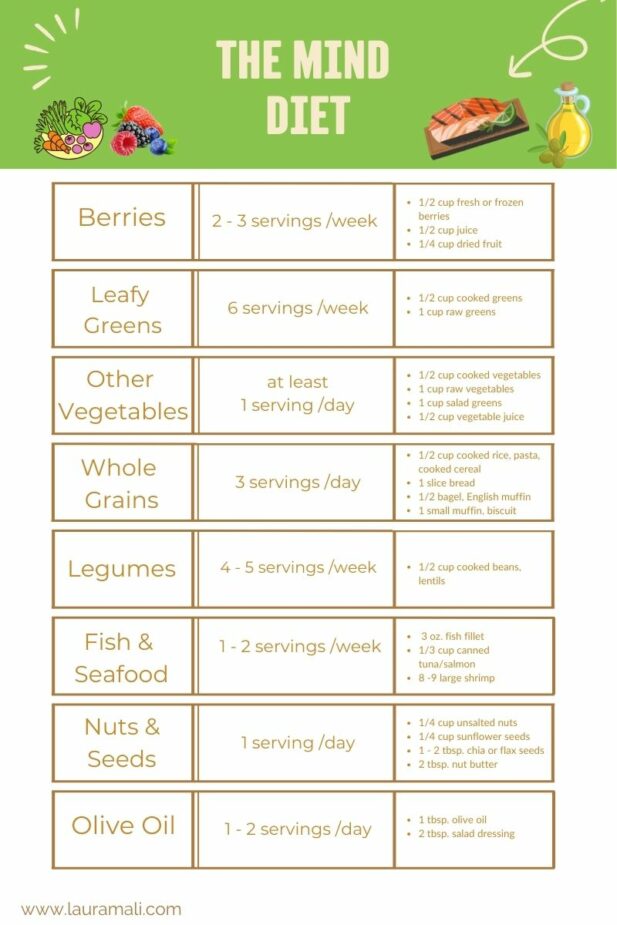
Foods to Avoid on the MIND Diet
While this isn’t a strict diet and there aren’t foods you need to completely avoid, the MIND diet does recommend limiting foods that are high in saturated fats, trans fats, and sugar as these are detrimental to brain health.
- High Saturated Fat Foods: Cheese, red meat, cream, butter
- Foods High in Trans Fat: Fried foods, tropical oils
- Sugary Foods and Sweets: Cakes, cookies, pies, sweetened beverages
Pros of Following the MIND Diet
There are many benefits you may experience when following the MIND diet beyond brain health.
- Lowered Risk of Cardiovascular Disease
- Improved Mood
- Weight Loss
- Improved Energy Levels
- Better Sleep
- Improved GI Health
Cons of Following the MIND Diet
There are few risks or cons associated with this diet, however there are some people who should not follow this diet. Because it is high in leafy greens and vitamin K, people taking a blood thinner should not suddenly start this diet.
Also, people with kidney disease should talk with their Registered Dietitian Nutritionist, and Physician to determine if this diet is appropriate.
Similar to the other two diets, making these changes may seem overwhelming and like a lot of work. There are several easy ways you can start incorporating some of these principles today.
To help you get started I’ve created a 7-day meal plan that includes some of my favorite recipes and a shopping list. Download it here.
Which Diet is Better for You?
All three of these diets are consistently ranked as some of the best diets for overall health in the world. They are all healthy diets and encourage an increased intake of fruits, vegetables, whole grains, seafood, and nuts and seeds.
Most Americans would benefit greatly from making nutritional changes in line with any of these three diets, but some differences may make one better for you than another. Let’s look at some of the key areas for health and longevity.
For my Brain Health?
The MIND diet has significant research backing its ability to help slow cognitive aging and protect brain health.
Because The MIND diet specifically emphasizes foods known to support brain health, like berries and leafy greens, and limits those known to be detrimental to brain health, this dietary plan is the clear winner over the other two diets.
With that said, the MIND diet is based on a combination of the Mediterranean and DASH diets. Both of these diets also have research supporting their ability to reduce cognitive aging and support brain health.
While some research found improvements in cognitive health with a Mediterranean diet supplemented with antioxidant-rich foods, other short-term studies have not had the same results.
The DASH diet has also shown conflicting results. Over the years, some studies have shown improved brain function and slower cognitive decline while other studies have not seen the same results.
For people with a history of dementia in their families, the MIND Diet may be the best choice but following any of the three is a better option than a traditional American diet for brain health.
What about for my Heart Health?
For overall heart health and reducing the risk of heart disease, the diet with the most research supporting it is the Mediterranean diet.
Early observational studies with follow-up research identified those following a Mediterranean-type diet had a significantly reduced risk of a cardiovascular event compared to those following a reduced-fat diet.
Specifically, the Mediterranean diet with the addition of olive oil or supplemented with nuts saw the biggest decline in heart attacks and strokes.
In addition, the Mediterranean Diet lowered other Cardiovascular risk factors, including waist circumference, blood lipid levels (cholesterol, LDL cholesterol, and triglycerides), inflammation, and blood glucose levels.
Or my Blood Pressure Control?
The DASH Diet has been shown to have significant effects on lowering blood pressure and is now recommended as a first-line treatment for blood pressure reduction. Your healthcare team may also recommend medication, but please know that your dietary choices have a huge impact on what your blood pressure is.
The original DASH diet study found people with slightly elevated blood pressure (systolic blood pressure of 160 mm Hg or less and diastolic blood pressure of 80 to 95 mm Hg) who followed the diet for just 2 weeks saw significant reductions in their blood pressure which continued throughout the study.
Want even better Blood Pressure results? When the DASH diet is combined with a modest reduction in sodium intake, blood pressure levels are lowered even further.
While both the Mediterranean and DASH diets reduce blood pressure, the DASH diet is the winner when comparing the two.
If you are at risk for high blood pressure the DASH diet may be for you. Talk with your doctor and registered dietitian nutritionist to see if incorporating the DASH diet recommendations into your life is worth a try.
Let’s not forget about Weight Loss
All three of these diets, the DASH diet, Mediterranean Diet, and MIND diet appear to support weight loss and weight maintenance.
The DASH diet has been shown to help with weight loss, especially when combined with a lower calorie intake and exercise. The diet itself is high in fiber and low in fat and sugar, so for many people, this alone can help with weight loss.
The Mediterranean diet has also shown positive effects on both weight loss and weight maintenance with reports of people with high adherence to the Mediterranean diet having twice the likelihood of maintaining their weight loss compared to those who only partly followed the diet.
A recent study of over 1000 adults found those who had greater adherence to the MIND diet compared to those with lower adherence were 31% less likely to be obese. They also were 42% less likely to have elevated triglyceride levels than those partially following the diet.
Why is this important? Abdominal weight gain and elevated triglycerides are often indications of a higher risk of insulin resistance and metabolic syndrome. Reducing weight and your triglyceride levels can help lower your risk of developing type 2 diabetes and heart disease.
All three of these diets are healthy diets that emphasize fruits and vegetables, whole grains, and fiber-rich foods and encourage a reduced intake of sugar, fried foods, and saturated fat. These changes all help support weight loss and weight maintenance, especially when combined with exercise and other lifestyle changes.
FAQs
While each of these are labeled “diets” they are all very flexible and easy to follow. Instead of “diets” I like to think of them as eating plans or styles.
Here are a few questions I’m often asked and tips for how to incorporate these plans into your daily life.
Which is best for you to follow?
It depends on what your health risk is and what your goals are. This chart gives a quick overview of the main health benefits of each diet.
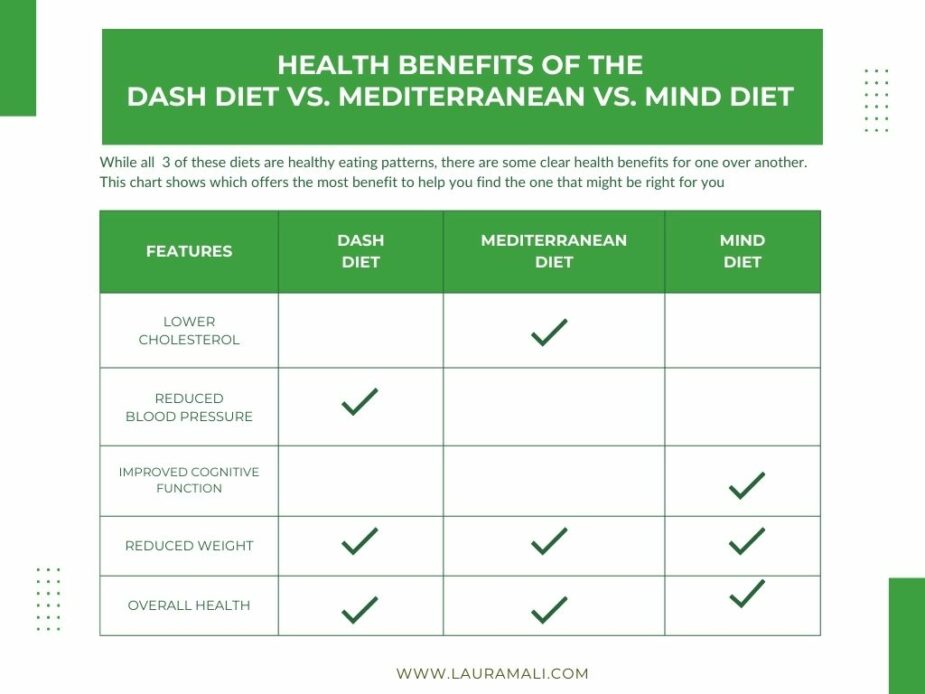
Can you eat out on these diets?
You can certainly enjoy eating in restaurants when following any of these plans. Restaurants are making it easier by offering more plant-based entrees, salads, and the ability to customize dishes. A few things you can do when eating out are:
- Choose entrees that include seafood, lean meat, or poultry.
- Ask for extra vegetables or a salad on the side.
- Choose a vinaigrette dressing instead of a creamy dressing.
- Enjoy a dessert once in a while, but not every time you eat out.
How can I get started?
Start with something easy to do. Maybe it is simply adding a handful of berries to your yogurt or oatmeal in the morning or enjoying a snack of nuts and dried fruit in the afternoons.
Another tip is to do some meal prep early in the week (or whenever fits your schedule best). Cut up vegetables to snack or to use in meals throughout the week.
- Pepper strips can be added to salads, and fajitas or sauteed with tomato sauce and chicken breasts.
- Lettuce can be washed and portioned into individual containers to make salads.
- Oranges can be segmented and stored in containers to toss into grain salads or mixed with berries for fruit cups.
- Cook a batch of grains like rice, barley, or farro to use in salads or entrees throughout the week.
- Make overnight oats or baked oatmeal to enjoy for a quick breakfast.
Do I have to be perfect?
You do not need to be perfect following any of these diets. Aiming for perfection often just increases your stress level, which also isn’t healthy! The goal is to make small, sustainable changes that become habits. (You can read more about how to do that in my post “10 Sustainable Habits for the New Year.”)
Even people who only partially followed each of these diets reduced their risk of heart disease, lowered their blood pressure, and reduced their risk of dementia.
Remember, small changes can make a big difference in your long-term health!
Resources
Want to learn more about one of these diets? Here are some of my favorite resources, many written by my fellow colleagues who I know and trust.
Note: These are affiliate links, which means if you make a purchase through one of these links, I will earn a small commission.
The MIND Diet for Two, by Laura M. Ali (this is my book!)
The MIND Diet Plan and Cookbook, by Julie Andrews, MS, RDN, CD
The DASH Diet for Dummies, by Sarah Samaan, Rosanne Rust, and Cindy Kleckner
The DASH Diet for Two, by Rosanne Rust
The Everything DASH Diet Meal Prep Cookbook, by Karman Meyer, RDN
The 30-Minute Mediterranean Diet Cookbook, by Serena Ball and Deanna Segrave-Daly
The Mediterranean Diet Cookbook for Two, by Anne Danahy, RDN
The Sustainable Mediterranean Cookbook, by Serena Ball and Deanna Segrave-Daly
The Mediterranean Dash Diet Cookbook, by Abby Gelman, MS, RD, CDN
Bottomline
The differences between the DASH diet vs. Mediterranean vs. MIND diets are minimal, but they are important, and the right one for you depends on your risk or concern for different health conditions. As a registered dietitian, I believe all three are healthy eating patterns and recommend all three of these diets for different reasons.

